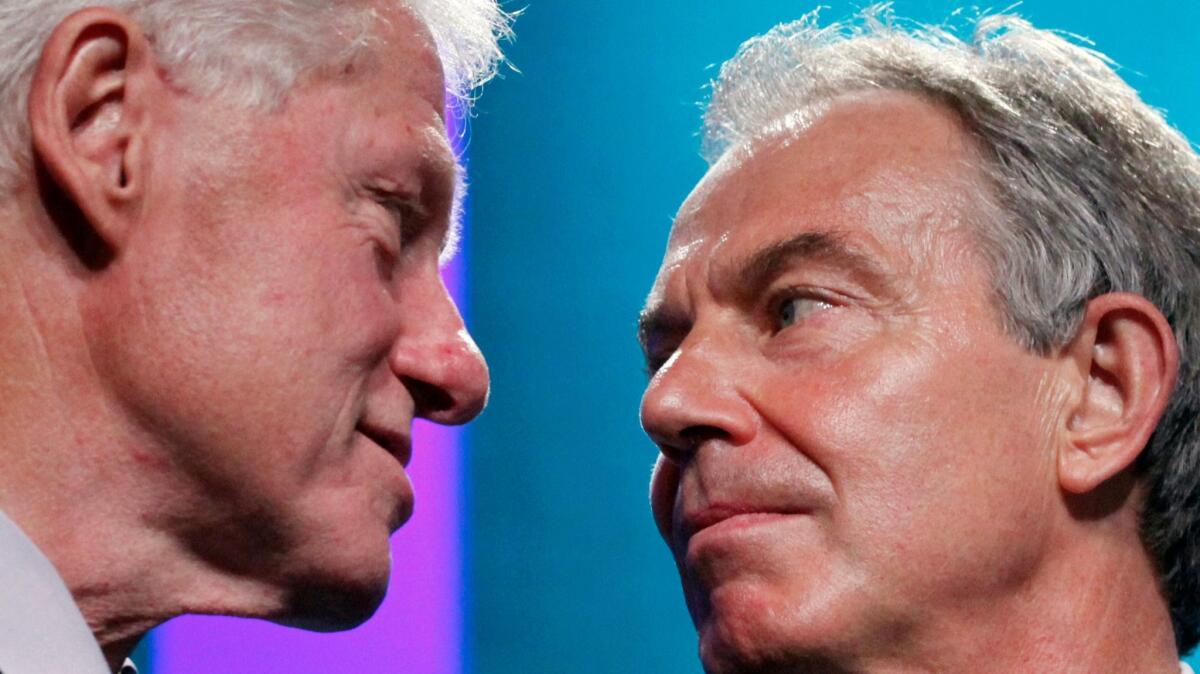Op-Ed: I’m a neoliberal and I’m proud

Invited to deliver a lecture last month at Chicago’s DePaul University on the rather straightforward topic “Dictatorships and Radical Islam: Enemies of LGBT Rights,” I was met with protest by a left-wing student group denouncing me as a “White, Zionist, neoliberal.” Guilty as charged.
What is neoliberalism? Denunciations of it are ubiquitous. A writer for The Guardian describes neoliberalism as nothing less than “the ideology at the root of all our problems,” one responsible for “epidemics of mental illness” that is “crushing the minds and bodies of millions.” Upon the election of Donald Trump, left-wing professor Cornell West declared “the neoliberal era in the United States ended with a neofascist bang.”
Reading the perfervid attacks on neoliberalism today, one is put in mind of what George Orwell observed seven decades ago about “fascism,” a word with “no meaning except in so far as it signifies ‘something not desirable.’ ”
Broadly understood, neoliberalism describes a set of policies generally aimed at reducing the role of the state in the economy. Neoliberals embrace free trade, capital and labor mobility, privatization, and fiscally solvent social welfare systems. Think Bill Clinton in the United States, or Tony Blair in Great Britain. Neoliberalism is embodied by the “Washington consensus,” a set of 10 economic prescriptions laid out by the International Monetary Fund and World Bank for developing countries beset by economic crises.
The neoliberal consensus born of the post-Cold War era collapsed alongside the 2008 crash.
But with the rise of Bernie Sanders on the left and Trump on the right, (as well as their European analogues), neoliberalism is under a two-pronged attack — and in serious need of defending. Left-wing critics decry neoliberalism as “market fundamentalism.” Right-wing critics assail it for encouraging “open borders.” Both are suspicious of free trade, which they paint as a zero-sum game in which third world labor benefits at the expense of first world blue-collar workers.
This is erroneous. Because other countries tend to have higher entry barriers for foreign goods, free trade agreements open more overseas markets to U.S. exports than they open the U.S. market to foreign competition. Free trade with Mexico in particular also has had a beneficial effect on that right-wing anti-globalist bugbear: immigration. An economically prosperous southern neighbor, which Mexico has increasingly become thanks to NAFTA, is one that will generate good-paying jobs, thus lowering illegal immigration to the U.S.
It isn’t neoliberal free trade regimes that are making manufacturing jobs obsolete in the developed world, but technology. A recent study by the Center for Business and Economic Research at Ball State University found that productivity growth — driven largely by automation — accounted for over 85% of the loss in manufacturing sector jobs between 2000 and 2010, as opposed to just 13% lost from trade. Western economies, in other words, are producing more things with fewer people.
In their opposition to free trade, Sanders, Trump and their acolytes are essentially asking the vast majority of Americans (as well as citizens of other countries) to suffer the costs of higher prices, reduced economic activity and slowing innovation on behalf of a small group of arbitrarily selected communities who are the losers of globalization. But it’s hardly clear that erecting trade barriers would even help these people. A joint UCLA-Columbia University study found that ending free trade agreements, on average, would cause the poorest 10% of consumers across 40 countries to lose 63% of their purchasing power.
To mitigate the crisis of work in the 21st century, governments need to provide better safety nets and job retraining for the unemployed. Limiting trade won’t help. Economic growth — stimulated by trade — will. Growth leads to higher employment and incomes, and, in turn, generates higher tax revenues with which to fund the very entitlement programs that left-wing critics of neoliberalism want to protect and strengthen.
The neoliberal consensus born of the post-Cold War era collapsed alongside the 2008 crash. Rather than reform liberal democratic capitalism to make it more inclusive, the radical critics who throw around “neoliberalism” like a dirty word want to overturn the entire system. According to a 2016 Harvard poll, a majority of millennials reject capitalism. In the recent French presidential election, some leftist intellectuals advised voters to stay home rather than vote for the centrist Emmanuel Macron over the far-right Marine Le Pen because, in the words of Marxist philosopher Slavoj Zizek, Macron represented “neoliberalism with a human face.”
Of course the status quo isn’t perfect, far from it. Critics of neoliberalism, however, have nothing new to offer. What they prescribe is the same old mix of heavy regulation, onerous trade barriers, and state-directed economic planning that brought the world success stories such as Venezuela and Greece. Indeed, one suspects that the anti-globalization movement’s beef isn’t ultimately with “neoliberalism” but plain old liberalism — that is, freedom.
For all its faults, capitalism has brought more wealth to more people than any other system in history. “People who live in a golden age usually go around complaining how yellow everything looks,” observed poet Randall Jarrell. The same could be said about today’s critics of neoliberalism.
James Kirchick is author of “The End of Europe: Dictators, Demagogues and the Coming Dark Age.” He is filling in for Doyle McManus.
Follow the Opinion section on Twitter @latimesopinion or Facebook
MORE FROM OPINION
The Paris agreement got the logic of climate action all wrong. Good riddance
Devin Nunes’ ‘comeback’ is bad for the Intelligence Committee
Amazon.com is a 21st century deal with the devil
Hawks vs. doves — which side would the founding fathers have taken?
More to Read
A cure for the common opinion
Get thought-provoking perspectives with our weekly newsletter.
You may occasionally receive promotional content from the Los Angeles Times.










